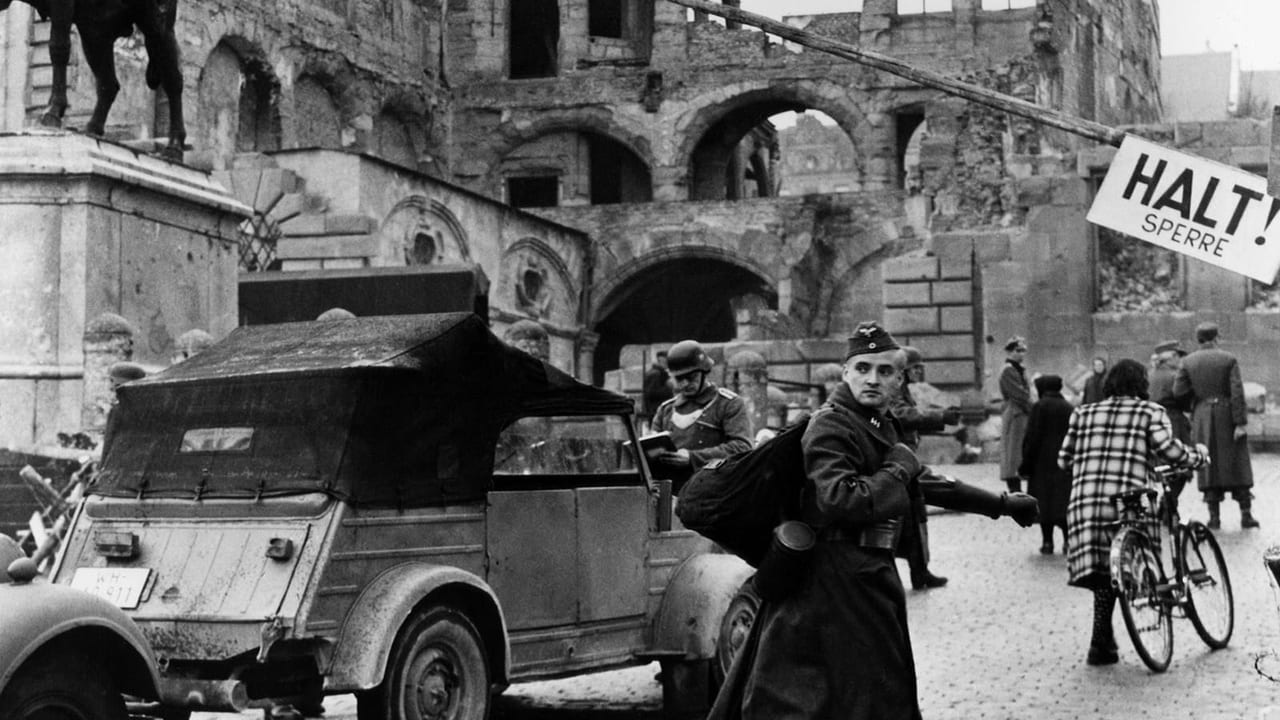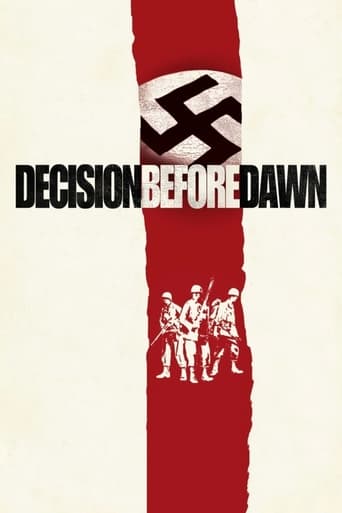

Very well executed
... View MoreThis is How Movies Should Be Made
... View MoreThe movie turns out to be a little better than the average. Starting from a romantic formula often seen in the cinema, it ends in the most predictable (and somewhat bland) way.
... View MoreA terrific literary drama and character piece that shows how the process of creating art can be seen differently by those doing it and those looking at it from the outside.
... View MoreGritty, Realistic, Superb Spy Film set at the Very End of WWII made only a Few Years After the Actual Time Frame. This is a Remarkable Film on Many Levels. It is Unlikely that Any Movie about the Second World War is so Out of Sync from its Time. It has a German Soldier as the Protagonist. A Sensitive P.O.W. Medic (Oskar Werner) Recruited as a Spy to Infiltrate and Discover Secrets.This is Film-Noir Territory (one of the few war movies that could be considered) with a No-Nonsense, Stripped of Gloss, On Location Filming, of Devastation, Despair, and Characters that have no Pretension and are Well Crafted and Acted. This is Very Believable Stuff. The Bombed-Out Buildings, the Air Raids, the Extras and the Style of the Movie that is Close to Docu/Cinema-Verite, All make this one of the Best and Least Known of Hollywood War Films.A Must See for War Historians, Film-History Students, Off Center Cult Movie Types, and Anyone Looking for Realism, Craftsmanship, and Unfettered Storytelling.
... View MoreTo me there's nothing, nothing that can compare with the locations of postwar Europe for drama and pathos -- The Third Man, The Search, and Decision Before Dawn. Actually, Decision Before Dawn was set during the war, towards the end, but all the locations, including interiors, are the postwar ruins of Germany. Producer/director Anatole Litvak used these locations brilliantly. Within them he staged crowd scenes, battle scenes and pursuits, wide-angle and closeup, that boggle the mind. Though Litvak didn't get a deserved a Best Director Oscar nomination, Decision Before Dawn did get a Best Picture nomination, for 1951.The cast credits are a bit deceptive. Although billed third, Oskar Werner is the undoubted star. From five minutes after the start to five minutes before the end, he is in virtually every scene. As an actor Werner is like another brilliant Austrian, Klaus Maria Brandauer. Both are mesmerizing -- each has a mannered hesitance that gives a move, a line a kind of italics. Even their eyes are captivating, Werner's limpid, Brandauer's penetrating. As much as I love to watch Werner and Brandauer, they both seem to gravitate towards tragic characters, like Brandauer's Mephisto and Colonel Redl and Werner's Ship of Fools and this movie. I never like to see these two meet bad ends, but I guess bad ends are what their personas call for.Decision Before Dawn (nice title but not much to do with the story) is also distinguished by a great supporting cast, including Richard Basehart and Gary Merrill and the incomparable Hildegaard Neff. See her also in post-war and Cold War suspense like Diplomatic Courier, opposite Tyrone Power, and The Man Between, opposite James Mason.Decision Before Dawn has a downbeat ending, which seemed to me a bit arbitrary, given some promising relationships. But we are also left with an intriguing question: Can a traitor be a hero? It's a question addressed by one of the best movies to come out of the postwar era.
... View MoreThe presence of this prestigious but obscure war/espionage movie among the Academy Award nominees for the Best Picture of 1951 where it was up against such heavyweights as A PLACE IN THE SUN, QUO VADIS and A STREETCAR NAMED DESIRE has always intrigued me. The film is certainly well-made and acted on the surface but, I suppose, what impressed most at the time was its being based on a real episode of WWII (back then a mere 6 years away), it was shot among the actual German ruins and served as an introduction to two German actors Oskar Werner and Hildegard Knef (billed here as Hildegarde Neff) who would subsequently become internationally renowned film stars; incidentally, I have just acquired two other espionage films the latter made around this time, DIPLOMATIC COURIER (1952; with Tyrone Power) and THE MAN BETWEEN (1953; co-starring James Mason). Despite being third billed (after Fox stalwarts Richard Basehart and Gary Merrill), Werner is the true protagonist of the film and he acquits himself superbly playing a meek medical soldier who, after seeing his comrade being pushed out the window to his death for passing disparaging comments on the Third Reich, decides to join the Allies by acting as their informer on the German Front; a youthful but unmistakable Klaus Kinski appears very briefly as another prospective candidate for the job. During the course of the film, Werner attracts the affection of two women a French girl (Dominique Blanchar) stationed in the monastery being used as the Allied H.Q. and a German artiste (Knef), sent by a suspicious, ultra-nationalistic German soldier he meets along the way to seduce him in his hotel room, but who eventually alerts Werner to his being watched. Merrill plays the sympathetic American superior officer while Basehart is the cynical communications official who accompanies Werner and an irascible German spy dubbed "Tiger" (Hans Christian Blech) into enemy territory. While accomplishing his mission of locating the new position of a German division that was being a thorn in the Allies' side, Werner is briefly engaged as the personal assistant of a proud German Colonel with a heart condition (a fine performance from O.E. Hasse) and ultimately gives his life for the cause on a beach after being chased around the rubble-strewn streets of Germany.
... View MoreAnd simply the best of its kind on the subject. All the more remarkable for "a Hollywood production," but for my money it might as well be "a foreign film." I agree with the user who thought it took courage to make this.If I had to focus on the screenful of superlatives, it would be on Litvak's direction, the acting by all and by a young Oskar Werner without question (Stateside viewers may also recognize Herren Blech and Hasse as well as Frau Knef), the photography, and of course the story. Note the film's at-first subtle transition that begins with Happy's re-insertion. Afterwards, view Bernhard Wicki's "Die Bruecke."A note to the user who gently griped over the perceived inaccuracy of shooters: Try that while standing in a wind tunnel and you'll have some small idea of the challenge posed by a contemporaneous bombing raid. At least they weren't standing beneath trees...(UPDATE: Seek, find and read "Call It Treason," a novel by George Howe dedicated "To Happy 1925--1945.")
... View More